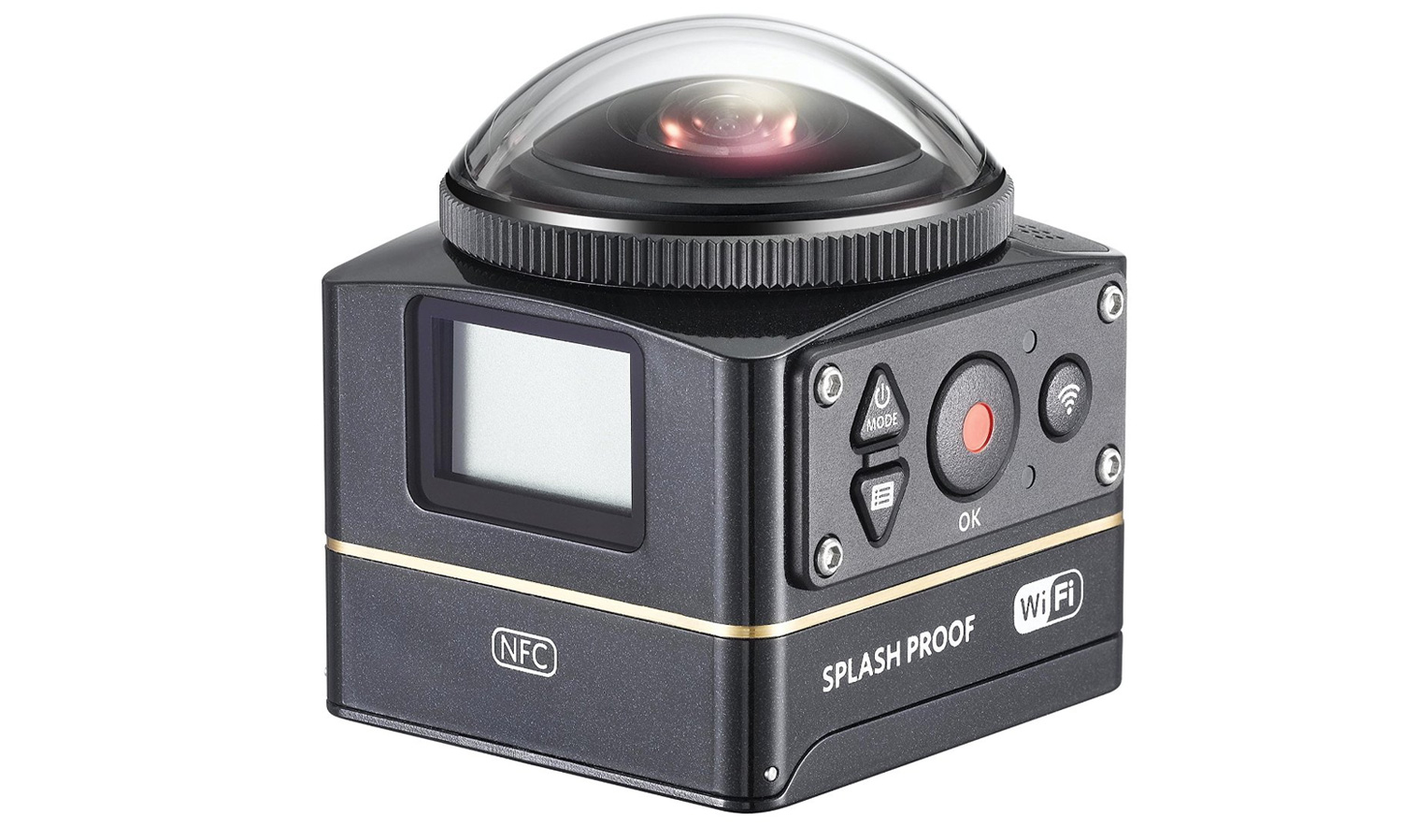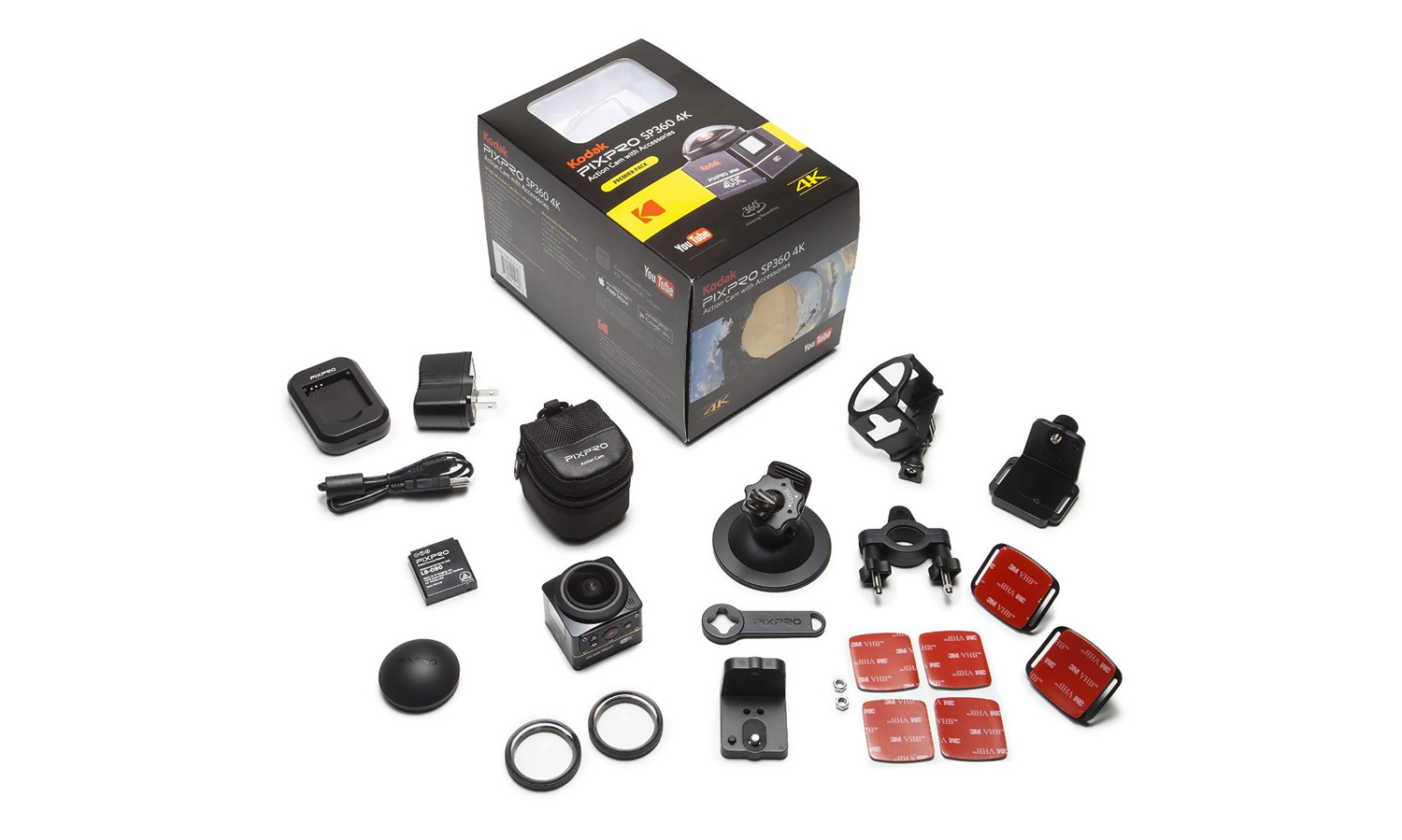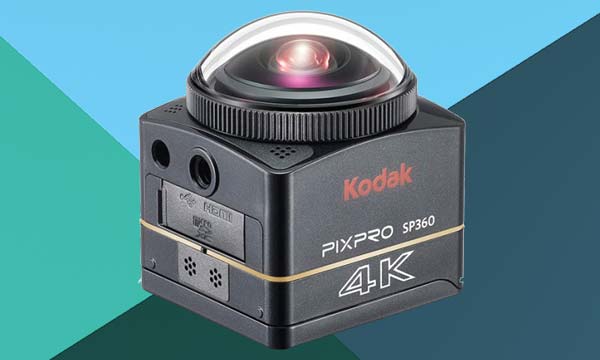Tom's Guide Verdict
The Kodak PixPro SP360 4K takes great video and is easy to use, but it's hamstrung by a less-than-functional mobile app.
Pros
- +
Great video quality
- +
Easy-to-use controls
- +
Lots of accessories
- +
Replaceable battery/SD card
Cons
- -
Desktop app required to make videos YouTube-ready
- -
Doesn't take full spherical video
Why you can trust Tom's Guide
Did you know Kodak built the first digital camera back in 1975? Although the camera maker missed its chance to corner that market, it's nice to see the company had the foresight to come out with one of the first 360-degree cameras. The PixPro SP360 4K takes fantastic photos and video, is easy to use, and comes with a ton of accessories. It's just too bad that the PixPro's mobile app is behind the times.
Design
Looking like an early version of R2-D2, the PixPro SP360 4K consists of a dome sitting on top of a small box. On one side, are several push-button controls, the largest of which is a red Record button. A second side of the camera has a small LCD, while the third side has a tripod screw mount and a plastic cover protecting the micro USB, micro HDMI, and microSD card slots. The bottom of the camera pops open so you can remove the battery.

Sadly, the PixPro SP360 4K comes only in black. The non-4K version of this camera comes in the traditional Kodak yellow, which looks much more distinctive.
Kodak's camera is 360 in the sense that it can capture 360 degrees either vertically or horizontally, but not both at the same time.
On its own, this 3.7-ounce camera is merely splash-proof, but Kodak sells a $55 waterproof case for the camera.
MORE: Best 360 Cameras
The PixPro's on-camera controls were the best of the cameras I tested. Buttons were easy to press, and the camera emits a loud beep when you start and stop recordings. Plus, a small LCD display made it easy to see if I was recording, and to see camera settings.
Performance
Kodak's camera is 360 in the sense that it can capture 360 degrees either vertically or horizontally, but not both at the same time (you get 235 degrees in the other direction, which isn't bad). For a full 360-degree view, though, you'll need to get a second camera, which doubles the price.
Despite having just one lens, Kodak's 4K camera delivered excellent image quality.
I could easily make out the rivets in the George Washington Bridge as I rode underneath it, and the colors of the sky and surrounding area were accurate.
App and Sharing
Kodak's app lets you change the resolution, camera mode and a lot of other settings. You can also view and share videos from the camera. Transferring video from the camera to your phone is very slow: It took nearly half an hour to copy a 6-minute video.

To convert the videos to a YouTube-compatible format, you have to use Kodak's desktop software. And even then, you might run into trouble. The software doesn't currently work on some Macs, like my 2012 MacBook Pro with Retina Display.
Extras
While all the cameras I tested have a tripod screw mount, Kodak offers the widest variety of accessories for attaching the PixPro to monopods, bikes or anything else.

The Premier Pack ($499) includes the camera, plus a handful of brackets and mounts.
Battery Life
I was able to record just about an hour's worth of video with the PixPro, about the same as with the Giroptic and 360fly 4K.
Bottom Line
If only Kodak made a better mobile app, its 360 camera might have been one of my favorites. Although the PixPro doesn't take a full spherical image, the 4K video it captures is crisp, clean and colorful. The camera's controls are easy to use, and it has a huge number of accessories for mounting the device nearly everywhere and taking it anywhere.
It's definitely a downer, though, that you have to use desktop software to make sure your videos are viewable on YouTube. The 360fly 4K camera doesn't have as many accessories as the Kodak PixPro, but it takes equally good video and stills, and makes your creations a lot easier to share.

Michael A. Prospero is the U.S. Editor-in-Chief for Tom’s Guide. He oversees all evergreen content and oversees the Homes, Smart Home, and Fitness/Wearables categories for the site. In his spare time, he also tests out the latest drones, electric scooters, and smart home gadgets, such as video doorbells. Before his tenure at Tom's Guide, he was the Reviews Editor for Laptop Magazine, a reporter at Fast Company, the Times of Trenton, and, many eons back, an intern at George magazine. He received his undergraduate degree from Boston College, where he worked on the campus newspaper The Heights, and then attended the Columbia University school of Journalism. When he’s not testing out the latest running watch, electric scooter, or skiing or training for a marathon, he’s probably using the latest sous vide machine, smoker, or pizza oven, to the delight — or chagrin — of his family.

